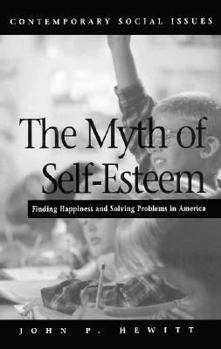The Myth of Self-Esteem: Finding Happiness and Solving Problems in America
Select Format
Select Condition 
Book Overview
Examines the conventional notion of self-esteem, argues that it has become a panacea, and discusses the concept's influence on education and psychology. This description may be from another edition of this product.
Format:Hardcover
Language:English
ISBN:0312175566
ISBN13:9780312175566
Release Date:January 1998
Publisher:Palgrave MacMillan
Length:171 Pages
Weight:1.65 lbs.
Dimensions:0.7" x 6.3" x 9.3"
Customer Reviews
1 rating
Self-Esteem ans you have never "seen" it before
Published by Thriftbooks.com User , 23 years ago
The Myth of Self-Esteem, by author and social psychologist, John P. Hewitt, offers a dispassionate, although slightly spirited, discourse on self-esteem in American society. Hewitt begins by stating, "the object of this book is to unravel the assumptions that are built into the contemporary usage and understanding of the idea of self-esteem and to build a more complete picture of this phenomenon and the importance we attribute to it." He goes on to state of his subject, "to learn something about the reality of self-esteem, we must first consider it as a myth - a set of beliefs contemporary people hold about themselves and their social world, stories they tell about themselves and their lives." Through focusing on the cultural rather than scientific significance of this uniquely western/American phenomenon, Hewitt challenges our assumptions about how we achieve success in the midst of despair and how we use this non-universal, in one respect, concept to buttress our identity in our daily interactions.Hewitt asks questions that cause one to wonder, "what exactly is meant when we say 'self-esteem'?" Do we mean what we intend, or have we fallen into the trap of engaging in empty dialogue without critically analyzing our intent. The Myth of Self-Esteem offers various vignettes that illustrate the varied ways not only that the term is used, but also its lack of solidity as to a definitional meaning. Also, given that many cultures around the globe focus more on humility as an admirable trait, how have Americans come to value two words that seemingly defy a single sufficient definition upon critical analysis?Strengths and WeaknessesOverall, the book is well written in that it provides the reader an opportunity to examine what is meant by "self-esteem" and the social structures that maintain such a myth.The strength of Hewitt's argument comes from his ability to illustrate, via the use of vignettes, the imprecise nature of a definition among many of the term "self-esteem." However, the weakness, although delineated earlier in the work, is that he does not relay on "scientific" studies. Although he chose to focus solely on the cultural component of the created phenomenon, adding to the discourse the positions of scientific research would quite possibly shed additional light on the subject and make his already strong argument stronger.What does it all mean?Hewitt, has done an admirable job of presenting considerable information, although not scientific, that yield many questions regarding self-esteem. While reading the book, many questions arose in my mind as to how I have come view myself in relation to others and my surroundings. It soon became apparent that such is due in part to my acceptance of many of the present social structures and limited concepts that attempt to define them. Given that I have undergone a shifting of consciousness, as it relates to my surroundings and my role in the creation and sustaining thereof, many of the previousl






